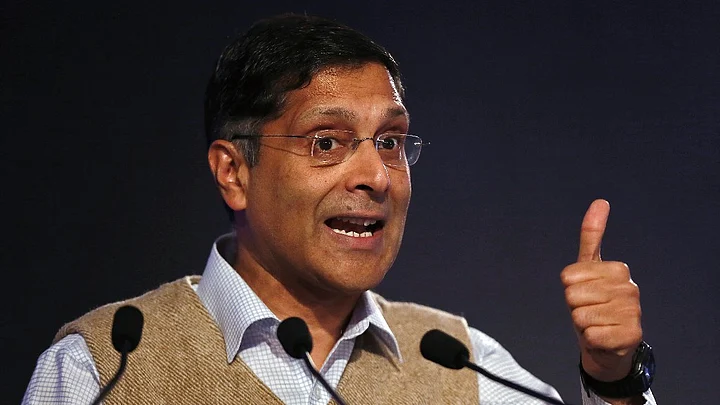Sticking to his analysis that India's economic growth has been overestimated, Arvind Subramanian said he had raised doubts about the GDP numbers in 2015 when he was the chief economic adviser of the Modi government as he found inconsistency between projected growth and other macro indicators.
In a new paper titled 'Validating India's GDP Growth Estimates', the former CEA said he had indicated his doubts on the growth numbers in the Economic Survey in 2015 as well as mid-year Economic Analysis.
During 2011-2016, the period he deduced to have seen GDP growth being overestimated by 2.5 percentage points, the Indian economy was hit by a series of shocks – export collapse, twin balance sheet problem, drought, and demonetisation.
"Growth in real credit to industry collapsed, falling from 16 percent to minus one percent, mirrored in the official figures for real investment growth, which declined from 13 percent to three percent; Real exports fell from 15 percent to three percent; Overall real credit slowed from 13 percent to three percent; and real imports slowed from 17 percent to minus one percent," he wrote.
But the new GDP series, adopted in 2015, suggested that despite all these large shocks, economic growth declined by very little, slipping from 7.7 percent to 6.9 percent.
“This situation invites a question: Is it really possible that these five large adverse shocks had such little impact on GDP growth?" he asked.
India’s gross domestic product (GDP) growth rate between 2011-12 and 2016-17 should have been about 4.5 percent instead of the official estimate of close to 7 percent, he claims.
"In January 2015, the CSO released new estimates using a new base year (2011-12 versus 2004-05), new data and new methodology. My team and I reviewed these estimates carefully – and immediately had questions about the new numbers,” he said.
“We consequently investigated the matter, but still could not find convincing answers, so we began to express our doubts internally and then externally," he added.
Countering the government arguments that had rubbished his June research on GDP numbers, Subramanian said the NDA government did bring reforms such as GST and new insolvency and bankruptcy law but these would "deliver growth benefits in the medium term".
He rubbished the productivity surge argument saying if that was so benefits accruing to firms in the form of higher profits would have been seen.
He also rubbished the consumption surge argument advanced by the government to counter his claim, saying if India had suddenly developed a unique model of sustained consumption-led growth it would have reflected in consumer confidence being high but the RBI's monthly Consumer Confidence Survey paints a different picture.
On the government argument that India’s tax-GDP ratio rose post-2011 period, he said revenues are affected by more than just economic growth.
"They are also affected by changes in tax policies and administration. Amongst the latter were the spate of measures to unearth black money, including demonetisation which led to a spike in collections in 2016," he said.
Stating that a variety of evidence suggests that it is likely that India’s GDP growth is being overestimated by the new methodology, he said the country’s sustained high measured GDP growth after 2011, despite large negative macro-economic shocks, is in contrast to the experience of other large emerging markets.
India clocked significantly higher measured GDP growth than all other countries in the post-1980 period, with the same export and investment growth rates, he said.
"The evidence suggests that measurement changes likely caused India's GDP to be overestimated in the post-2011 period. Moreover, while it is not possible to say precisely what India's GDP would have been absent the measurement changes, the evidence suggests that the discrepancy in measured GDP growth post-2011 is likely to be significant," he added, suggesting the GDP methodology be revisited.
